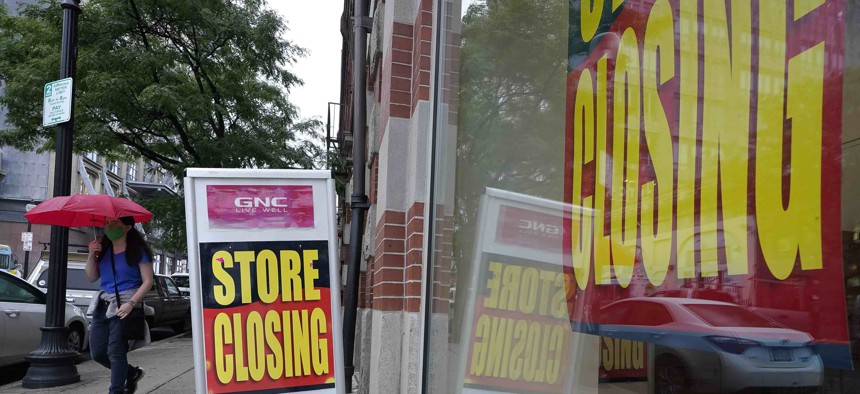1-in-4 Adults Say Household Finances Deteriorated From March to September

In this Sept. 2, 2020 photo a passerby walks past a business storefront with store closing signs in Boston. AP Photo/Steven Senne, File
New survey data from the Urban Institute presents these and other troubling findings about how many Americans are faring economically as the coronavirus pandemic wears on.
One in four adults across the country reported that their family’s financial situation was worse in September than in early March, back before the coronavirus pandemic slammed the economy.
That's according to Urban Institute research released Tuesday based on recent surveys. The findings highlight how damage to household finances is especially bad for people who are Black, Latino and poor.
More than one-third of Latino adults, nearly three in 10 Black adults, and just over four in 10 adults with pre-pandemic family incomes below the federal poverty level reported being worse off financially in September than in March, according to the Urban Institute.
Latino and Black adults both reported food insecurity rates at around 30%, roughly double the rate for white survey respondents. Overall, the share of people reporting food insecurity increased from May to September, from 17.9% to 19.6%.
Food insecurity was particularly high—about 37% in September—in households where an adult lost a job.
Virus-driven job losses and pay cuts have hit disproportionately hard in the service sector and lower-paying segments of the economy, while wealthier Americans and many white collar professionals who can work from home generally have been more insulated so far.
The new survey findings show that 60% of adults in households suffering job losses since March reported that their families had cut back spending on food, while about 45% have spent all or most of their savings and about four in 10 have taken on more credit card debt.
As households struggle, there likely will be an increased demand for safety net programs at a time when state and local government budgets are getting stretched by declines in tax revenues and unplanned spending related to public health.
The findings that some households are depleting savings and taking on high-interest credit card debt to get through the pandemic also adds to troubling questions about the long-term financial harm that the pandemic will leave behind even after the virus wanes.
The Urban Institute findings mirror other recent research on the economic fallout from the pandemic.
A poll conducted during July and August on behalf of National Public Radio and other organizations found at least half of households in each of the nation’s four largest cities have faced serious financial problems during the virus outbreak.
That survey also found outsized hardships among Black and Latino residents and those earning less than $100,000 a year.
Democrats and Republicans in Congress and the White House have failed for months to come to agreement on another round of significant federal aid that might help households more easily weather the economic downturn brought on by the virus.
Earlier legislation provided aid like “stimulus” checks of up to $1,200 for many individuals and boosted unemployment benefits. The Urban Institute researchers note that food insecurity decreased between late March and May as that federal money flowed.
Respondents to the September survey included 4,007 adults who were among about 9,000 participants in a poll conducted between March and April. More about the research can be found here and here.
Bill Lucia is a senior reporter with Route Fifty and is based in Olympia, Washington.
NEXT STORY: If You Soak the Rich, Will They Leave?






